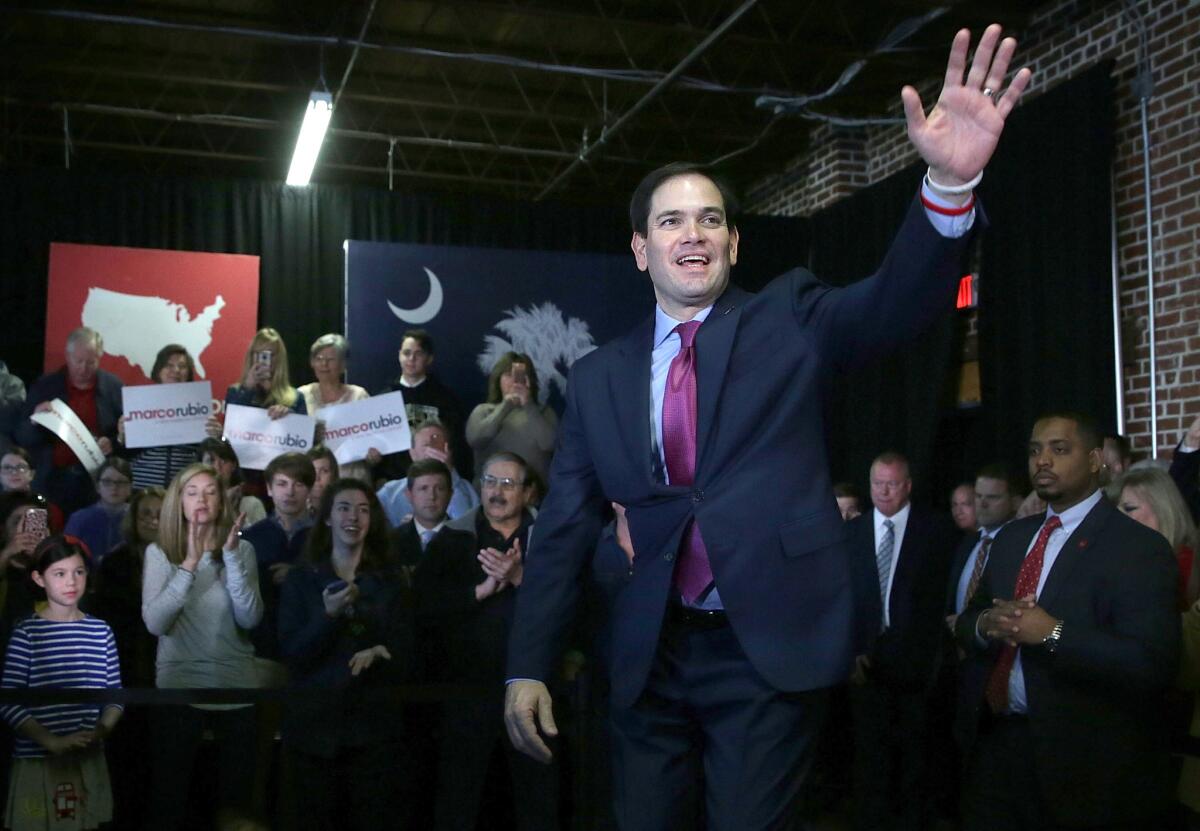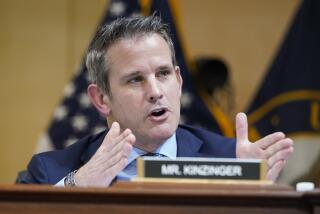South Carolina’s long-held outsider sentiment is troublesome for establishment Republicans

Sen. Marco Rubio of Florida campaigns Thursday in Greenville, S.C., for Saturday’s Republican presidential primary.
- Share via
Reporting from Greenville, S.C. — If the Republican establishment was looking for a comeback or a last stand, they could have landed in a more hospitable state than South Carolina. The anti-establishment fervor that has gripped the rest of the country in recent years came earlier here — decades earlier, by some estimates.
Going into Saturday’s GOP primary in South Carolina, three establishment candidates — Sen. Marco Rubio of Florida, former Florida Gov. Jeb Bush and Ohio Gov. John Kasich — share the support of about a third of the electorate here. And more than 60% of South Carolina Republicans are somewhat or very dissatisfied with the Republican congressional leaders, according to a Monmouth University poll taken this week.
“You can trace that rebellious strain all the way back to firing on Ft. Sumter,” said David Woodard, a Republican consultant and political science professor at Clemson University, referring to the battle where the opening shots of the Civil War were fired as South Carolina became the first state to secede from the Union. “They don’t want to be told what to do.”
There’s about 30% of the people in our primary that are just mad as hell and Trump is playing to their fears.
— Sen. Lindsey Graham
The pro-outsider sentiment here threatens to put the establishment candidates in a deficit that will be all but impossible to recover from as the primary season speeds ahead and front-runner Donald Trump looks to pile up the election-night wins and delegates needed to secure the Republican nomination.
South Carolina’s history of electing insurgent candidates dates at least to Strom Thurmond, the former segregationist who ran for president in 1948 as a Dixiecrat and represented South Carolina in the U.S. Senate into the 21st century. He was soon followed by Jim DeMint, whose sharply conservative views predated the rise of the tea party movement.
At a packed Cruz rally at a civic center in Anderson this week, some of the most enthusiastic applause came during the introductions, when a pair of congressmen from North Carolina and South Carolina were lauded for helping force House Speaker John A. Boehner to retire last year.
Yet Woodard points to a tension between mainstream and insurgent forces that has also produced more moderate politicians. Democrat Ernest Hollings, who served alongside Thurmond for many years, and Republican Sen. Lindsey Graham, who overlapped with DeMint and remains influential in the Senate, have both crossed party lines on notable occasions.
But Graham’s enthusiastic endorsement of Bush has not helped much in the polls. Graham helped draft bipartisan immigration legislation that has been panned by Trump and Cruz.
When Trump invoked his name at a rally, it drew louder boos than Hillary Clinton’s name.
“I actually think he’s a nice guy,” Trump continued, taunting Graham, who had sparred with Trump during his own brief presidential run. “Is he going to be reelected?”
The audience booed again.
Graham, who easily won reelection in 2014, said Trump had gone to “Kookland” this week and attributed his popularity to a fringe group of irrational voters, amid a primary season that’s “almost insanely crazy.”
“There’s about 30% of the people in our primary that are just mad as hell and Trump is playing to their fears,” Graham told reporters after a Bush rally in Summerville, S.C. “But 70% of the people in this state are not buying what Trump’s selling.”
In other years, South Carolina’s Republicans have coalesced behind establishment candidates in their presidential primary, picking the eventual nominee in every election between 1980 and 2008. The streak was broken in 2012, when former Speaker Newt Gingrich defeated Mitt Romney, the eventual nominee. It was the only state Gingrich won outside Georgia, his home base.
The biggest hope for an establishment comeback may lie in the state’s popular governor, Nikki Haley, who endorsed Rubio this week. Originally elected as an insurgent in 2010, she has come to be seen by many as establishment — she endorsed Romney in the 2012 primary — and has become one of Trump’s biggest critics. Haley is popular in the state, even among people interviewed this week at Trump rallies. But her criticism of Trump, which began with an implicit rebuke of his immigration rhetoric during a nationally televised address in January, has not dented his popularity here.
“She was just playing politics with the establishment in Washington,” said Larry Jones, 67, a retired steelworker who lives in Travelers Rest. “She’s fine otherwise.”
In July, following a racially motivated massacre at a black church in Charleston, Haley led the effort to remove the Confederate flag from the state Capitol grounds in Columbia. Her leadership was praised by many who were eager to put the long-simmering controversy to rest. But 70% of Trump supporters regret the removal, with only 20% supporting it, according to a poll released this week from Public Policy Polling, a firm that often works for Democrats.
“They should have left well enough alone,” said MaryAnn Riley, a 79-year-old Spartanburg resident who wore an American flag coat and matching cowboy hat to a Trump rally this week.
Riley believes the issue has helped Trump attract voters.
“He stayed out of the fray,” she said. “He’s not for this political correctness thing.”
Still, Haley’s endorsement of Rubio could help him draw support away from other candidates, including Bush and Cruz.
Fresh off the endorsement, Rubio campaigned at an old warehouse building by the railroad tracks, now used as a Crossfit gym, just outside downtown Greenville on Thursday morning. Inside the brick walls, he gave an uplifting address about overcoming the nation’s challenges and choosing the most conservative candidate who can win in a general election.
It was a sharp contrast to Trump’s mega-rally in which he warned that America is becoming a third-world country, or Cruz’s stem-winding sermon about the dire threats to religious and constitutional rights.
The crowd, many in jackets and office attire, nodded as Rubio described his rise as the son of immigrants who worked as a maid and a bartender. Then he called the state’s African American senator, Tim Scott, and a popular congressman, Trey Gowdy, to the stage to stand beside him and Haley, the daughter of immigrants from India.
Haley grabbed the microphone.
“Take a picture of this,” Haley said. “Because the new group of conservatives that’s taking over America looks like a Benetton commercial.”
Music began blaring from the speakers — a Christian rock song called “Welcome to the New.” Almost everyone held up their cellphone cameras to take a picture.
Staff writer Seema Mehta in Summerville, S.C., contributed to this report.
Twitter: @noahbierman
ALSO
Latinos seek answers from Sanders and Clinton in Las Vegas
Manny Pacquiao posts Bible verse that states gay people should be killed
Change in bullet train construction plans will delay rail line’s arrival in Southern California
More to Read
Sign up for Essential California
The most important California stories and recommendations in your inbox every morning.
You may occasionally receive promotional content from the Los Angeles Times.










